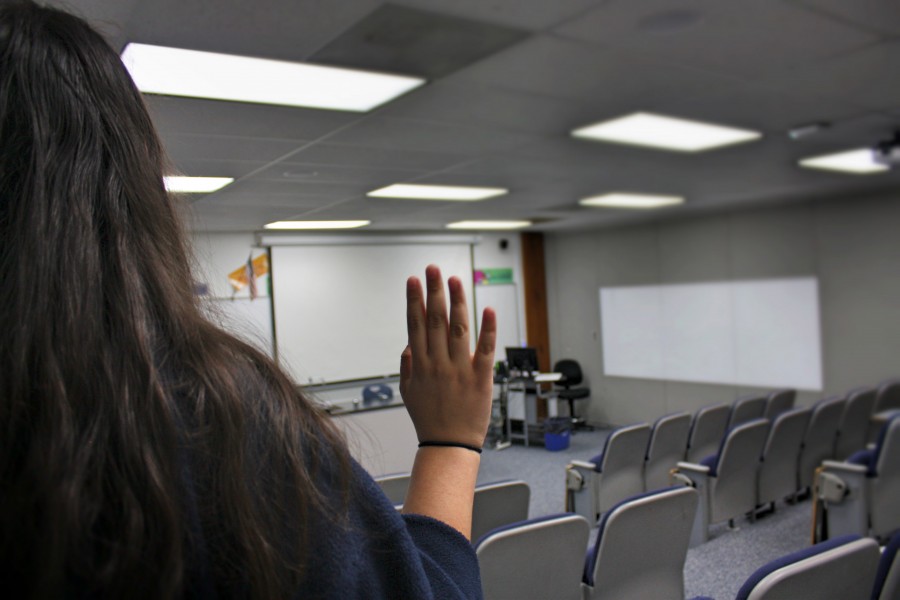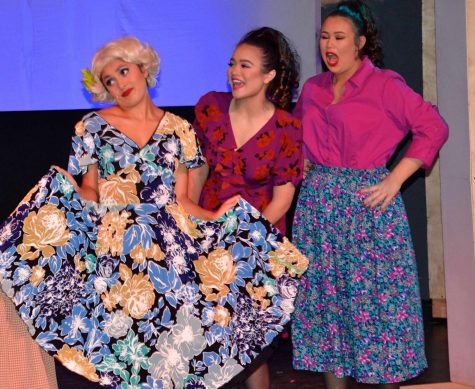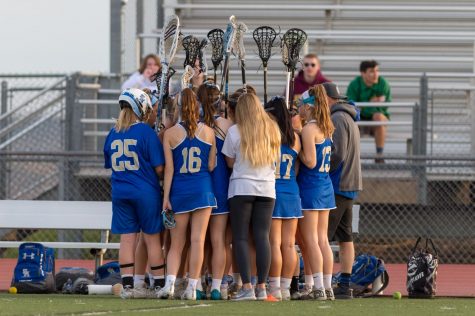Fate in peers
Sushi thief receives prosecution from peers.
Within the walls of this court, defendants’ consequences are not decided by adults, but by their fellow high school students. This is Peer Court. And defendants of misdemeanor charges must answer to and accept the sanctions imposed to them by their peers.
On April 14, several SMCHS students volunteered to be jurors for Peer Court and, in doing so, swore the Oath of Confidentiality. They were presented with a defendant arrested for stealing a box of sushi at Whole Foods. Ironically, the defendant’s family has a business, and the defendant has caught shoplifters on his family’s video surveillance himself and then been forced to call the police.
“His attitude was nonchalant,” said sophomore Isabella Marquez, a member of the jury. “He had sunglasses hanging on his shirt and you could see his leg moving like he was anxious to just get out of here.”
The everyday Science Lecture Hall may not seem as formal and imposing as an official courtroom, but SMCHS jurors were armed with questions and decisions that carry just as much weight.
“If he went to Whole Foods, which is kind of expensive, why didn’t he pool all the money together with his friends and buy something big?” Marquez said. “He answered that he usually eats sushi and was interested in body building, and he really needs the protein and doesn’t eat specific types of meats.”
According to Marquez, the defendant claimed to be a morally good person and stated that he would have eventually returned the money on his own. However, the owed money and formal apology was only sent to the store on the morning of the trial.
“So, I would say, in getting [these] answers, the person was kind of oblivious and didn’t care about the actions he committed,” Marquez said.
In the beginning, the defendant had laughed and smiled a bit when he gave some of his answers before he became serious. But as specific and factual questions were shot out one after the other, the defendant’s confidence waned.
“[SMCHS students] had very pertinent questions tailored to this young man, and it got to the point where he was getting embarrassed,” said Carolyn Bien, secretary of Activities. “I think it’s more of a deterrent that he won’t do it again. You don’t want him to get that cool factor, that this was no big deal.”
In the end, the jurors gathered together to discuss the sanctions that would be placed on the defendant.
“There were people pushing for saying that he was just a teenager and all he did was steal sushi,” Marquez said. “But you still need to remember that he broke the law.”
The final decision was family counseling, 25 hours of community service, attendance at a seminar about the legal system and to serve as a juror in another Peer Court. These sanctions have to be completed in four months.
“I personally wanted to give him more because, for someone doing no extracurriculars or sports and just going to the gym to work out along with his regular school work, he had a lot of time to complete all the actions that we wanted him to do,” Marquez said.
The opportunity for volunteer jurors to decide on the sanctions is an educational experience where they get to be immersed in the serious atmosphere and feel the weight of the law. For the defendants, it is an impactful experience that makes them think twice about their crimes.
“Having their own peers also make that sentence is to say, ‘These people are your own age. They don’t think it was a good idea either. This is the sentence they imposed on you. Not us,’” said Judge Kim Hubbard, who presided this case. “Sometimes you wonder [why he did that]. Maybe it was just to see what it was like – could’ve been that silly. It’s not good decision-making. So we’re all trying to teach some good decision-making,” Hubbard said.
In addition, Peer Court is a chance for defendants to avoid the intimidating atmosphere of official courtrooms and juvenile halls.
“You don’t want to be there (juvenile halls),” Hubbard said. “There’s razor wire around the premises – you’re basically incarcerated.
The defendant in this case had some aspirations to start his own company one day, and a clean slate can help him achieve that goal.
“It’s an opportunity for [the defendants] and hopefully they are scared enough that they’ll never do it again,” Bien said.











